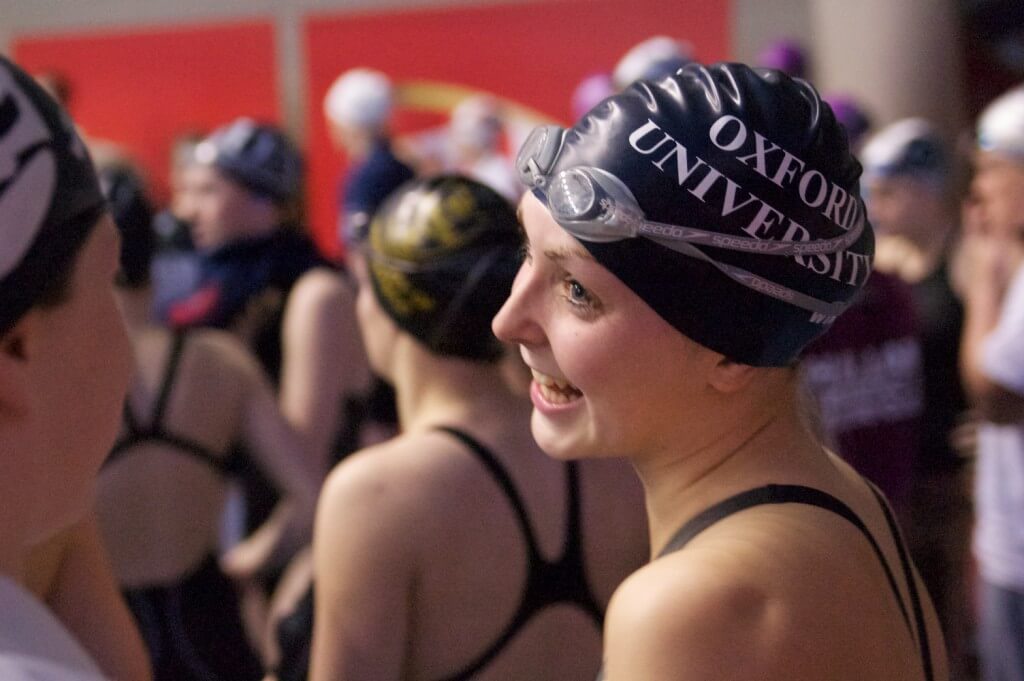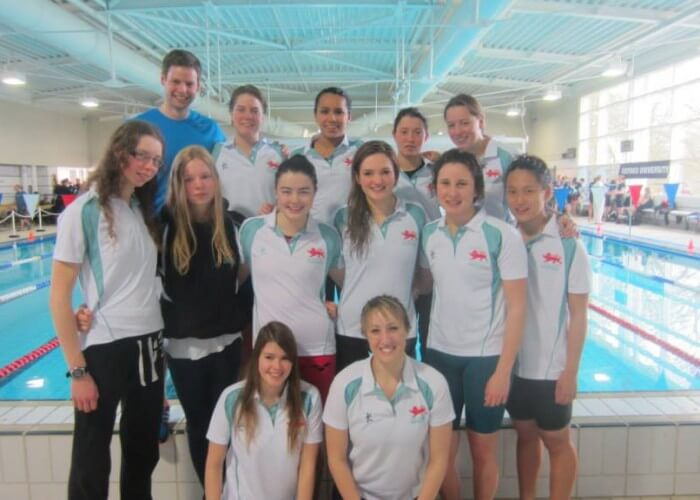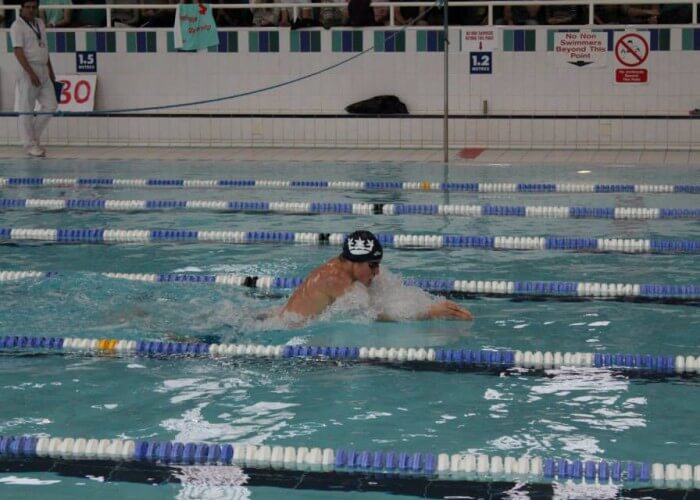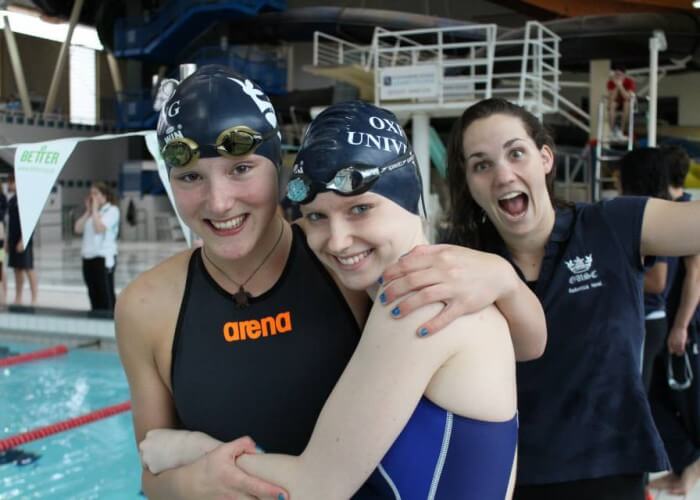Oxford v. Cambridge Historic Match Set to Draw Fast Finishes

By Sophia Chiang, Swimming World College Intern
One of the world’s longest running collegiate dual meets, the historic Oxford v. Cambridge match-up is set for February 27 at the University of Oxford’s Rosenblatt Pool. The meet was first run in 1892 at the Kensington Pools in London until 1999 when the meet was moved to the university facilities, where to this day the venue alternates yearly between both universities. The event, which is considered the highlight of both the Oxford and the Cambridge swimming calendars, is the meet for which both teams seriously gear up towards. Which means we get to see both university’s fastest swimming at this dual meet, and it’s pretty exciting.
Last year, the University of Oxford triumphed over the University of Cambridge, however, this may be the year that changes. But I wouldn’t count on it. Last year’s match saw Oxford win 110-67, just shy of a record-breaking high score. Oxford will be looking to bring another strong team to the table: veteran Naomi Vides as well as top scorers James Ross and George Stannard.
Oxford’s men are a pretty strong team, and decisive finishes last year showed that. Last Matt Courtis (2:06.15) and Stannard (2:10.91) led Cambridge’s Graeham Douglas (2:11.08) and James Fountain (2:14.33) by a good length to sweep the first event, the men’s 200m individual medley, and indicated the start of a record-breaking meet for the Oxford University Swimming Club.

Photo Courtesy: Cambridge University Swimming Club
After sweeping the first six men’s events, Oxford set in for a neat lead, with Ashwin Menon (58.48) taking the 100m backstroke, Ross (1:55.83) grabbing the 200m freestyle, Courtis (56.28) sweeping the 100m butterfly, Heerden Herman grabbing the 400m freestyle lead in 4:07.14, and Xander Alari-Williams taking gold in the 100m breaststroke (1:02.60). The only individual event the Oxford men lost was the 100m freestyle, where Cambridge’s Dale Waterhouse cleaned house in 52.53, half a second ahead of Oxford’s Tom McLean (53.08).
While Oxford’s men mostly maintained the lead by hitting 1-2 or 1-3 finishes, Cambridge’s men were able to stay in the game through second place finishes, like Waterhouse’s silver in the 100m backstroke (1:01.26), Calum Ferguson’s 100m butterfly (56.23) silver, and Dominic Holloway (1:03.73) and Graeham Douglas’s (1:07.31) 2-3 finish in the 100m breaststroke. However, the decisive meet finisher ended up being the relays, where Oxford’s men easily dominated both the 4x100m freestyle and medley relays, winning with a five second lead in the medley relay (3:53.94 to 3:59.13) and a six second lead in the freestyle relay (3:31.90) to (3:38.74).
Those finishes are not to be underestimated. In the 100m butterfly, Courtis and Ferguson were 0.04 seconds apart in the finish, and Douglas was right on Stannard’s tail for the silver in the 200m individual medley (2:11.08 to 2:10.91). While that helped maintain the Oxford men’s lead last year, decisive wins could make a difference this year. With the changing nature of Varsity from year to year with so many veterans graduating and fresh talent being brought in, the meet is constantly different which makes it exciting to watch as well as making it anyone’s game. Of course, with so many tried and tested athletes still on both universities’ rosters, it’s hard to predict how far those roster changes will go.

Photo Courtesy: Oxford University Swimming Club
Last year, the women’s side was tied four events in until Oxford’s women rallied and grabbed gold in both the freestyle and medley relays. As relays are worth much more than individuals, relay wins are key to winning the trophy, and can separate the competition.
Oxford also has several very strong women on their side. For example, women’s veteran Naomi Vides is a force in the pool. Vides grabbed gold in the women’s 200m individual medley (2:24.00) and the 400m freestyle (4:38.68), and nobody, short of Cambridge’s recruiting of top new talent, will stop Vides from racing to two more golds this year.
Similarly, Oxford’s Holly Winfield is a strong butterfly talent, and grabbed gold in the 100m butterfly in 1:06.08 last year. Close finishes last year determined the grit of Oxford’s women, where they fought for that first place position in events like the 100m butterfly, where Katherine Pyne (1:06.96) and Cathy Breed (1:07.46) fell to Winfield. Oxford’s Rachel Andvig pulled a 59.39 to Cambridge’s Alexandra Wiseman (59.61), earning those crucial points that would keep Cambridge’s women back. Yet Cambridge held on for a good meet, grabbing many crucial second and third place finishes. The way the meet rules work is 1-4 and 2-3 are equal points-wise, and making sure to take second can keep Cambridge holding on into the relays. In that respect, they should not be underestimated.
Other than the relays, Cambridge’s best hope would be for stacking the 100m backstroke. Of course, without Cambridge’s Wiseman, who graduated last year, freestyle events will most likely be Oxford’s game unless Cambridge brings in game changers. Most women’s individual wins fell to Oxford, including the 100m breaststroke (Tamsin McKinnon, 1:17.67) and 100m freestyle (Rachel Andvig, 59.39) along with the wins pulled in by Vides and Winfield.
But the obvious answer to a Cambridge victory would be the relays if Oxford is unable to grab an early lead. Last year, Cambridge’s 4×50 women’s medley relay was disqualified, leading to an easy victory for team Oxford (2:04.00). However, Cambridge does have potential. The 4×50 freestyle relay was a very close finish with less than a second between teams (Oxford, 1:50.96; Cambridge, 1:51.57). Less than a half second drop between each Cambridge athlete would have guaranteed a win for them, and while at that point last year there would’ve been no salvation for them anyways (they lost any chance at a victory with the women’s 4x 50medley relay disqualification), this year, it could make a difference.

Photo Courtesy: Oxford University Swimming Club
But the Oxford athlete to watch is Vides, who is Oxford’s top scorer and amongst the most experienced. Vides was selected for the 2012 British Swimming Olympic Developmental squad, and while she didn’t have prospects for 2012 and does not for 2016, she is a game changer at this varsity meet. Vides holds multiple Oxford pool records and if anyone knows how to make Oxford’s line-up work to the team’s advantage, she does. On Cambridge’s side, high point scorer Pyne is a force to be reckoned with as well, and she may very will tie down some golds this year. Having veterans like these will make the line-ups going into this year’s meet very interesting indeed.
The Oxford v. Cambridge Varsity meet for 2016 will take place on February 27, 2016 at Oxford’s Rosenblatt Pool in Oxford, England. For more information, please visit the Oxford University Swimming Club site.




Last year the men won 57-33 and the women won 53-34. I’d hardly say that makes the men “bulletproof” and women unable to “rally” and not very “solid” …
We really appreciate coverage of the Oxbridge Varsity match, but whoever wrote this hasn’t got a clue about the nature of the competition or the strengths of the 2016 teams. There aren’t medals, so use of ‘golds’ is just baffling, half of the name-checked athletes have graduated, and a quick Google of BUCS results would be able to suggest which new recruits to watch out for- Heider and Felgate for Cambridge are way more of a threat than Pyne. That said, BUCS results would also clearly show Cambridge’s chances are pretty close to zero this year.